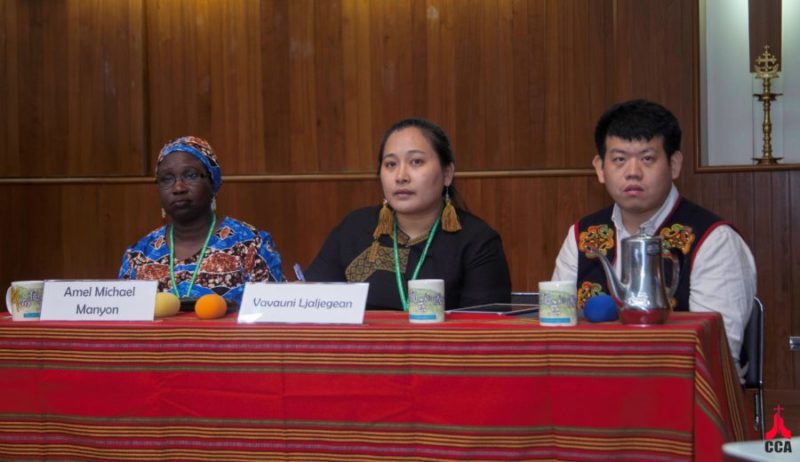Taiwanese indigenous woman theologian Vavauni Ljaljegean tells AEWA, “Without truth, there is no true reconciliation; without justice, there is no reconciliation”
 Plenary Thematic Presentation by Evangelist Vavauni Ljaljegean (centre), moderated by Rev Amel Manyon (left)
Plenary Thematic Presentation by Evangelist Vavauni Ljaljegean (centre), moderated by Rev Amel Manyon (left)
HSINCHU, Taiwan: “As reconciliation is the mission of God, it is God’s positive action directly participating in all broken relations. The aim of reconciliation is to reveal the truth which was covered and obscured, to heal those who suffer from the realities of injustice, and to transform those wounded to be recovered in the love of Christ. Therefore, without truth, there is no true reconciliation; without justice, there is no reconciliation,” young Taiwanese indigenous woman theologian Vavauni Ljaljegean, said at the first thematic plenary session of the Asian Ecumenical Women’s Assembly (AEWA).
Delivering AEWA’s first thematic presentation on ‘Arise, Be Awake to Reconcile, Renew, and Restore the Creation’, Evangelist Vavauni demonstrated parallels from the story of the ‘voiceless Tamar in her suffering’ in the Old Testament, and added that the suffering of Tamar should be understood in three perspectives: personal or family perspective, social perspective, and theological perspective.
“Like Tamar, a young lady who had suffered from the loss of dignity, Taiwanese indigenous women suffer. No one hears their crying; even their closest brothers and family wouldn’t hear their cries and voices. These indigenous women are actually marginalized in their families. There is no one caring for their suffering,” thus narrated the forthright woman theologian about the ongoing injustice faced by the Taiwanese indigenous people.
“I call myself ‘Taiwan Indigenous Person’ because this term is a living testimony to how we are stigmatized and associated with words like ‘laziness’, ‘uneducated’, ‘uncivilised’, and ‘immoral’,” Vavauni, who serves as an evangelist of the Presbyterian Church in Taiwan, shared.
Explaining the systemic and systematic oppression of the indigenous people, Vavauni also visualized the daily realities many indigenous women face as victims of trafficking and forced prostitution.
“Indigenous women experience ‘strongly doubled marginalisation’ and ‘collective stigmatisation’. Their inherent gender coupled with male chauvinism and outmoded philosophies relegate them as the silent minority. Although the government and civil society have been trying to promote the policy of transitional justice and achieve social reconciliation, I ask, where is the voice of Taiwan Indigenous girls on this journey of justice? Where is their crying in the miserable history of my people? Their voices are still unheard, but their crying is clear to my ears,” Vavauni implored the participants.
Rev Amel Michael Manyon from Australia moderated the session.
A plenary session addressed by four panelists introduced the theme, ‘Towards Caring and Sustaining the Creation’ from different perspectives.
Ester Damaris Wolla Wunga from Indonesia, in a powerful and moving presentation, expounded on the life and position of women in her region Sumba, and the conditions that push many into a life of hardship and misery.
“Women are the most vulnerable to discrimination, violence, and exploitation in Sumba,” she said.
Wolla Wunga called on the church to break its silence and emphasized the importance of education in empowering women to say ‘No!’ to violence in all its forms, in fighting an oppressive culture, and in being able to speak for themselves.
Suganthenee Niles from Sri Lanka gave a compelling presentation on the threats and problems plaguing the environment in the 21st century, and she reiterated that humans had a God-given responsibility to be caretakers of the creation and not be destroyers of it.
Lending a unique Buddhist perspective on the theme, Venerable Jeungmoon, a South Korean Buddhist nun spoke of the need to find, reconcile, and redefine the true potential of the self as creation; this was essential in order to better understand the creation around us.
The young Buddhist nun from the Mahayana tradition provided an interesting analogy of a rainbow to understand the self, wherein the seven colours combined created a beautiful phenomenon because each component possessed its own individuality.
In her presentation, Rev Dr Jeaneth Faller from the Philippines affirmed, “To sustain God’s creation, we go beyond merely protecting the physical environment. More importantly, we need to aim at creating a human ecology which makes the existence of every creature more dignified, protecting the radical good of life in all its manifestations, and preparing for future generations and environment closer to that which God planned.”
Rev Dr Faller also spoke about the painfully arrogant and human-centric perspective of people that had led to the degeneration of creation and the disruption of the Circle of Life.
Siniva Vaitohi from New Zealand moderated the panel presentation
The Asian Ecumenical Women’s Assembly (AEWA) is currently underway at the Presbyterian Bible College in Hsinchu, Taiwan, from 21 to 26 November, 2019.










